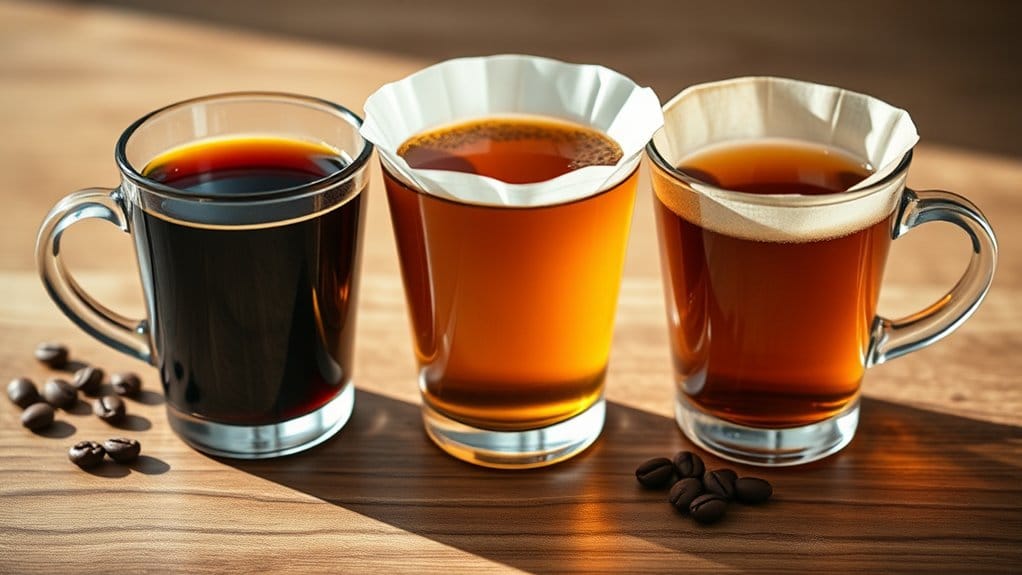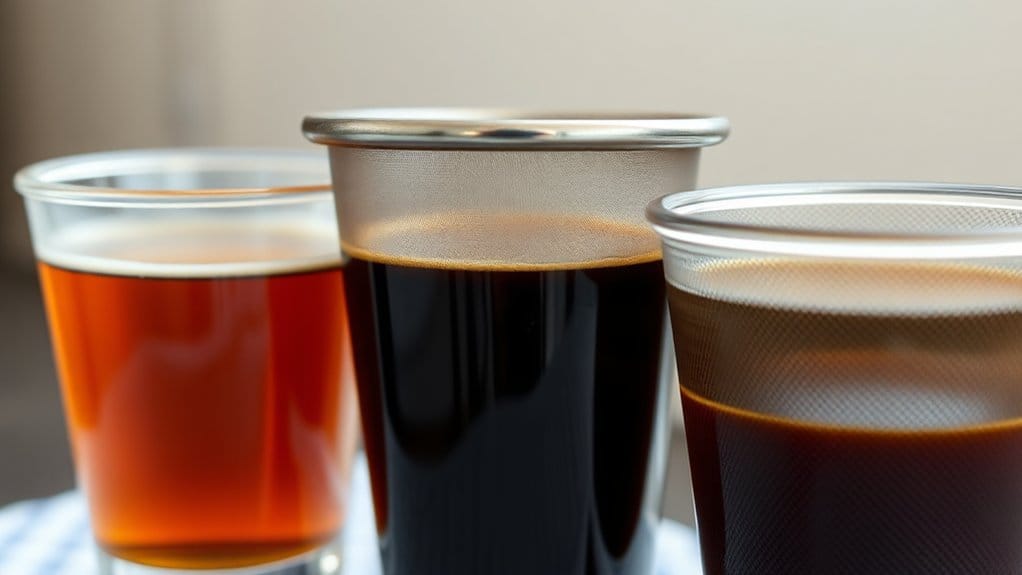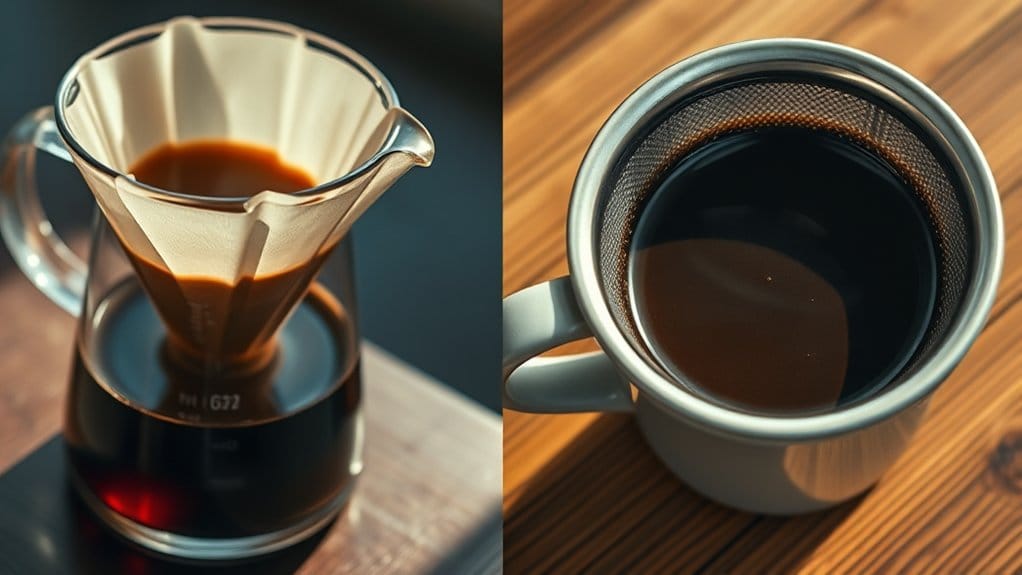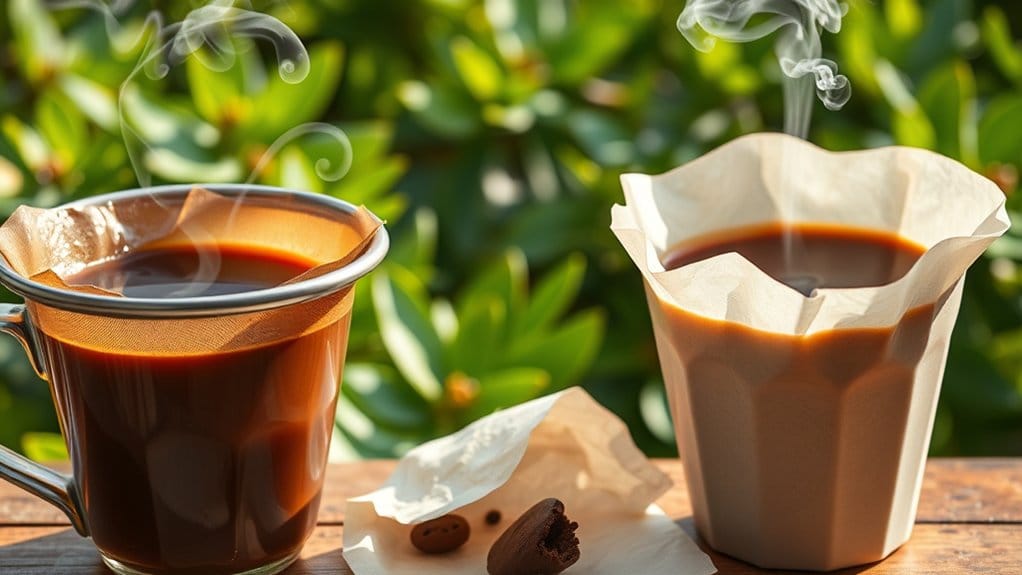Physical Address
304 North Cardinal St.
Dorchester Center, MA 02124
Physical Address
304 North Cardinal St.
Dorchester Center, MA 02124

Your choice of coffee filter can seriously affect the clarity of your brew. Paper filters trap sediments, giving you a smooth cup, whereas metal filters funnel through oils for a richer, cloudier flavor. Cone-shaped filters improve extraction for deeper flavors, and matching the filter size to your brewer is key! Want to avoid a coffee overflow and guarantee perfect extraction? Stick around, and you’ll reveal more secrets to crafting your ideal cup!

When you brew a cup of coffee, the filter you choose plays a critical role in how clear that delicious liquid turns out.
Using a paper filter? You’re in for a treat! It’s great at trapping all those annoying sediments, giving you that smooth, clear cup. The thickness and density of filters are key factors in selection; thinner, denser filters (around 0.15mm) are best for lighter roasts to retain clarity, while thicker filters (0.22mm to 0.28mm) work better for medium and dark roasts to balance extraction. Quality filters can significantly influence the overall flavor and clarity, determining how well the oils and granules are captured. Additionally, using a medium-coarse grind size can help further improve the clarity of your brew by allowing for even extraction.
A metal filter, conversely, lets more oils flow through, which might make your coffee taste richer but can cloud up your cup a bit.
If you’re feeling adventurous, try a cloth filter. It strikes a middle ground, letting some oils in for flavor whilst keeping most sediment out.
And just when you think you’re set, remember bamboo filters are here too. They promise a smooth brew but aren’t remarkably different from paper.
Happy brewing!
Even though you might think that the coffee beans themselves hold the key to a great brew, the filter shape plays a huge role in extraction, too.
Imagine pouring water over coffee grounds; the filter’s shape influences how that water flows. Flat-bottom filters spread water evenly, creating a clean cup. However, the type of filter you choose can also affect the clarity and richness of your brew. Additionally, container shape impacts mass transfer during brewing, altering extraction levels based on the filter selected. Choosing the right method is essential because extraction time significantly determines the final flavor profile of your coffee.
But cone-shaped filters? They produce a deeper coffee bed, slowing flow for richer flavors and improved body. Isn’t that fascinating?
You might find that the shape affects taste more than grind size! A well-timed brew can draw out lively notes as well as keeping your coffee crystal clear.

Choosing the right filter for your brewing method can be a game-changer for your coffee experience. Imagine savoring the perfect cup, where every sip shines.
If you’re using a pourover like V60, stick with cone or flat-bottomed paper filters for clean extraction. An Aeropress? Those small disc-shaped filters work wonders for quick brewing. For a French press, utilize the metal mesh for a full-bodied taste. Metal coffee filters promote sustainability while providing rich flavor. Additionally, using the right grind size enhances the extraction process and contributes to the clarity of your cup.
Maybe you’re all about the Clever Dripper? It loves flat-bottom paper filters. Remember, proprietary filters from makers like Chemex or Breville are designed for peak performance, so don’t skimp!
Mixing filter types can lead to interesting results, but it’s a gamble. So, what’re you feeling today — clarity or body?
Even though you mightn’t think about it often, filter size and fit play a crucial role in how your coffee turns out. Choosing the right filter can mean the difference between a rich, flavorful brew and one that’s weak or cloudy.
For instance, a #2 filter works well for 1–6 cups, whereas a #4 filter fits better for 8–12 cups. If your filter doesn’t match your brewer, watch out for overflowing coffee disasters! Properly sized filters promote even water flow, maximizing extraction.
And let’s face it, nobody wants a gritty cup of coffee. Furthermore, using the right Chemex Bonded Filters contributes to a superior brewing experience. So, next time you brew, remember: the perfect filter helps your coffee shine bright like the morning sun! Happy brewing!

When you’re brewing your favorite cup, have you ever paused to think about the impact of your coffee filters?
Believe it or not, your choice can make a difference! Consider this: single-use paper filters pile up in landfills daily—millions tossed away.
Instead, why not grab a reusable metal or cloth filter? They’re durable and cut down waste. You could even try innovative materials like banana fibers or even edible rice paper!
Not only do these options minimize pollution, but they likewise unlock new flavors in your brew. Additionally, using high-quality beans like Arabica beans can enhance your coffee experience. Plus, they save you money in the long run.
Yes, using a paper filter can definitely affect coffee flavor. It tends to remove oils and fine particles, resulting in a cleaner cup, but might sacrifice some body and complexity in taste compared to other filter types.
Yes, you’ll notice flavor differences among paper filter brands. Each brand’s thickness and fiber composition influences extraction, oil retention, and clarity, in the end shaping the taste of your coffee and enhancing or muting specific flavor profiles.
You should replace your metal filter every 3 to 4 months for ideal performance. If you notice slow brewing, off-flavors, or visible damage, it’s best to clean or replace it sooner for a better coffee experience.
Yes, water temperature absolutely influences coffee clarity. Hotter water can over-extract compounds, leading to bitterness, whereas cooler water might under-extract, risking sourness. Aim for 195°F to 205°F for ideal balance and clarity in your brew.
Yes, old coffee grounds can impact clarity, regardless of the filter you choose. Stale grounds lack aromatic compounds and integrity, leading to muted flavors and a cloudy brew that doesn’t satisfy your coffee cravings.